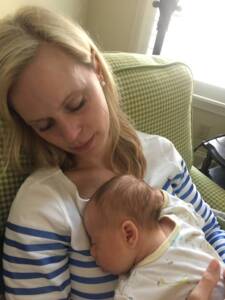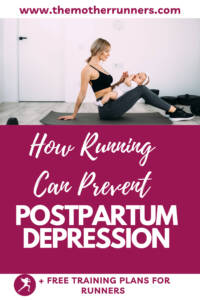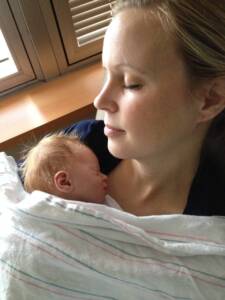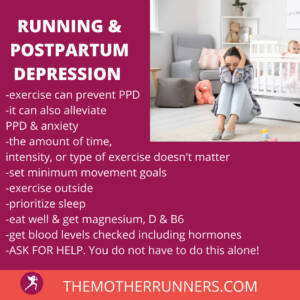I am writing this article in May which happens to be Mental Health Awareness month in hopes that it helps women struggling with postpartum depression—as running and exercise can help with postpartum depression. But it can be hard to start exercising or running when you are depressed, let alone sleep-deprived, and time-poor.
I think so many women struggle with postpartum depression and anxiety and not even realize it. Just recently did I have the lightbulb turn on that I likely suffered from both PPD and postpartum anxiety. Honestly, the feelings I had after having both of my children have cemented my decision to not have another child.
My experience with postpartum depression and postpartum anxiety
After having my first child, I was so riddled with anxiety. Every sound she made freaked me out. I never felt calm—even when she was sleeping. Not sleeping and the hormonal shifts only exacerbated how I felt.

Three years later, I had my son and the anxiety returned. I am still in awe of moms who seem so at ease with infants. That was never me.
My anxiety was coupled with what was likely undiagnosed postpartum depression. My son was a preemie and after he was several months old, I started to feel very angry—most of the time. The rage was intense, and I had suicidal thoughts and fantasies of running away. I thought my family would be better off without me.
I knew these feelings were NOT ME but I couldn’t control them.
Thankfully, I still ran as running was the only thing that made me feel like me—it made me still feel in control of my body, thoughts, and identity. But I didn’t tell anyone about how I was feeling. I felt alone and shame. It was my deep dark secret. It’s only now—years later, that I realized how much I was struggling all on my own.
Related: 7 Science-backed Reasons Running Makes You a Better Mom
How running helped my PPD and anxiety
Running may have been what saved my life.
After a particularly bad workout, my running coach—who I had only hired recently after befriending another mother runner who encouraged me to work with him—suggested I get bloodwork done. He knew I was not performing to my capability and speculated I had low iron.
Related: Dangers of Low Iron in Runners
I had very low iron (ferritin), yes—but I had a host of other problems including whacked-out hormones. My estrogen was sky-high. The doctor who read my results asked how I wasn’t “punching everyone in the face” walking around with my hormones as they were.
It was incredibly validating and comforting to know that these scary thoughts were not me—and they were a result of my hormones going haywire. I began taking a supplement called I-C-3 which in just a couple of months brought my hormone levels into normal ranges. My mind and body started to feel better.
Related: How to Tell if a Supplement is Good

I am lucky that I had running as a lifeline during this time. From an early age, running has been my crutch to help me through hard times. Thankfully, it was there for me during this. If I had not had it, I feel certain I would have been deep into a hole of postpartum depression and anxiety—and would not have figured out the cause for a long time.
I think many women suffer from PPD and anxiety and don’t realize it—especially since it can arise months after giving birth (and the required PPD screening). I spoke with fellow mother runners and consulted with psychologists to write this article which I hope will help others get help for PPD and anxiety, and use running as one of the tools to do so.
Related: Hidden health benefits of running
In this article, I will answer:
- What are signs of postpartum depression and postpartum anxiety?
- What are risk factors for postpartum depression and postpartum anxiety?
- How long does postpartum depression and anxiety last?
- What should you do if you think you have postpartum depression or postpartum anxiety?
- What are treatments for PPD and PPA?
- How can exercise help postpartum depression and anxiety?
- Real-life experiences from moms who used running to help overcome PPD
- Plus, tips for how to start running when you have PPD or PPA
So, let’s go.
What is postpartum depression? What is postpartum anxiety?
Postpartum depression, also known as PPD, is a medical condition that affects women after giving birth. PPD can occur within the first week or year of having a baby, and affects about 15 percent of new moms (though, that number is likely higher since many instances may not be recorded). Half of the women who suffer from PPD have never experienced depression in their lives.
Postpartum depression is different than the “baby blues” which may include mood swings from hormonal shifts, crying spells, anxiety, and difficulty sleeping. Baby blues usually start within 2 to 3 days of having a baby and resolve within two weeks. Postpartum depression, on the other hand, is severe and chronic.
Postpartum anxiety is another medical condition, often accompanied with PPD, that occurs after having a baby. It involves excessive worrying that is all-consuming.
Related: 5 Ways to Find Time to Run
What causes postpartum depression and anxiety?
Postpartum depression and anxiety result from physical, hormonal, psychological, and social factors. After giving birth, women experience a rapid drop in hormone levels, including estrogen and progesterone, which can contribute to mood changes and depression, explains Dr. Sanam Hafeez, a neuroscientist located in New York City.
Additionally, sleep deprivation, stress, lack of social support, and pre-existing mental health conditions can all increase the risk of PPD and anxiety. Women with a history of depression or who have experienced significant stress, such as a recent loss or major life changes, may be more likely to experience PPD. Other risk factors include a difficult or traumatic childbirth experience, a lack of social support, financial stress, and a history of abuse or trauma.
What are the signs of postpartum depression and postpartum anxiety?
Both postpartum depression and postpartum anxiety can trigger mental and physical symptoms.
According to Dr. Hafeez and sports psychologist Dr. Haley Perlus, postpartum depression symptoms and anxiety may be:
- lack of interest in your baby
- low confidence and “what’s wrong with me” feelings
- isolation
- physical discomfort
- feelings of sadness, hopelessness, or despair
- irritability or anger
- anxiety or panic attacks
- sleep disturbances
- appetite changes or weight loss/gain
- fatigue or loss of energy
- feelings of guilt or worthlessness
- difficulty concentrating or making decisions
- thoughts of self-harm or suicide
I think it is really important to note that PPD can arise MONTHS after you give birth. AND, PPD can occur even if you never had it with previous births.
Related: How Running Makes You Happy
What causes postpartum depression and postpartum anxiety?
The causes of postpartum depression and postpartum anxiety can be hormonal changes and exhaustion.
Risk factors for postpartum depression and postpartum anxiety may include:
- A history of mental illness including depression
- Lack of a supportive network
- Having a multiples birth
- Stressful events
- Financial trouble
- History of abuse or trauma
- Becoming pregnant at a young age
- Complications with your pregnancy or birth
- Having a baby with special needs
How long does postpartum depression and anxiety last?
Postpartum depression can last for months or years, especially if untreated. Even those who receive treatment can experience PPD symptoms for a year or so.
It is advised that if you have more than two weeks of feeling emptiness, sadness, or flatness, you should seek help which could be therapy, medication, or a combination.

What should you do if you think you have postpartum depression or postpartum anxiety?
You should be screened for postpartum depression after having your baby. If you were screened and not identified as having PPD or risk factors for PPD—or you developed it after the screening, you need to get help.
Talk to your doctor, nurse, or midwife. They should be able to help you come up with a treatment plan or refer you to a specialist such as a therapist or psychologist.
It is not advised to try to overcome postpartum depression or anxiety on your own, though there are lifestyle changes you can make to help. However, when you are feeling hopeless and helpless, being able to make these changes on your own is very difficult.
Related: The Best Foods to Eat Postpartum
What are treatments for postpartum depression and postpartum anxiety?
In most cases, postpartum depression and postpartum anxiety are treated by therapy and/or medication. Be sure to talk to your doctor about medication that is safe for breastfeeding if you are nursing. Note that antidepressants may take a few weeks to work.
Also, note that popular medications for PPD called Brexanolone and Esketamine are not safe for breastfeeding or pregnancy.
From personal experience, I think it is important to get your hormone levels checked. I had extremely high estrogen which made my mood swings and feelings of anger incredibly intense. After getting those regulated by supplements, I felt more like myself.
Related: Does Running Cause Imbalanced Hormones
Does exercise help with postpartum depression?
Study after study shows that moving your body can improve your mental health, and the effect on postpartum depression is no different. Indeed, research supports that exercise can help alleviate postpartum depression symptoms.
Dr. Hafeez explains: “When exercising, our body releases endorphins, natural feel-good chemicals produced by the brain that helps boost mood and reduce stress and anxiety. Additionally, exercise can improve self-esteem, increase energy levels, and promote better sleep, which can benefit women experiencing PPD.”
The frequency and intensity of exercise can play a role in its effectiveness in reducing PPD symptoms, she advises.
- Low-intensity exercise, such as walking, can help reduce symptoms of depression and anxiety.
- More vigorous exercise, such as running or strength training, may significantly reduce PPD symptoms, mainly when done regularly.
- What’s more—a meta-analyses show that exercise can be a tool to prevent postpartum depression.
According to Dr. Perlus, physical activity and fresh air will help with emotional regulation.
“Setting short-term (i.e. daily) goals around physical activity/exercise will improve focus, motivation, and confidence as well. When we move our body, we still our minds and give ourselves a moment of mental recovery and renewed energy,” she explains.
Related: A Complete Guide to Running While Pregnant
How can you motivate yourself to exercise when struggling with postpartum depression?

How can you exercise when depressed and just getting out of bed is difficult? I posed this question to our experts as well as fellow mother runners. Most said that setting small movement goals paved the way for regular running and better mental health.
Below are some of their experiences with PPD and running:
- “For me, getting my heart rate up in a healthy way has always been helpful with (anxiety). I struggled tremendously with my first and second births, even getting to the point that I was convinced if I asked for help that my kids would be taken away. For my third I knew I needed a better path, I exercised all through that pregnancy and fed my body well, I started running a couple of months after my third was born because I knew from my first two that a big part of managing my anxiety especially postpartum was giving myself space and time to be me. Running quickly became my outlet for self-care.”
- “I started feeling anxious 6 or 7 months postpartum so I was already running and I really didn’t understand what was happening…It wasn’t crippling or anything, I was pretty much myself just intrusive thoughts and a constant nervousness and fear once the pandemic hit…I changed therapists…(and) running was always there, it’s always been my go-to when I’m not feeling myself.”
- “Well, I didn’t have it with my first 3 and I figured I was ‘immune.’ Then when I had it with my 4th I didn’t even know what was going on. By my 5th I knew it was happening. My ob prescribed some medication that made it all WAY worse. I had resigned myself to the fact that I was NOT A RUNNER. One day I felt like I had nothing else to do to escape my racing thoughts but to run. No clue why I did it, but I wanted to run a mile without stopping. Once I did that I felt proud of myself for the first time in a long time.”
- “My twins were born at 27 weeks, in the NICU for 3 months. When we finally got home, the symptoms started. I’ve been through PTSD before due to childhood trauma. I recognized what it was and was determined to not be a victim of it again. So I prayed and asked God for a way out of the hell I was experiencing. That’s when I remembered that running was always a good outlet in the past, so I talked to my husband and my in-laws. Was very honest about what I was dealing with and they told me they would watch the kiddos so I could run. I didn’t run fast, it was a lot of run/walk, but the steady pounding of the pavement, mixed with fresh air, sunshine, and prayer while I ran let me shut out the attacks.”
- “I was fortunate to be surrounded by supportive people —my husband, friends, and coworkers. When I got to a place where I felt like I could share where I was at with those closest to me, I had so much support and encouragement. I started really slowly —only did one mile a day for weeks. And sometimes I would do that mile and just go right back to bed. But over time, I started to feel the benefits/freeing effect of running (and sometimes walking) and looked forward to that part of my day…One day, I looked back and realized that the clouds were beginning to part. Anxiety and depression are still something that I battle with, but exercise, having goals, pushing myself… it all reminds me that I am stronger than I give myself credit for and that I control the narrative.”
- “My son has a brain injury from birth. When he born, we thought he was dead…(after the NICU), I took him running with me almost every day. It was the best way to settle my thoughts and work out my anxiety and calm myself. Running is my mood stabilizer and my boy is my miracle.”
Related: How to Regain Your Running Motivation
Below are tips to help overcome postpartum depression and anxiety with lifestyle changes:
- Talk to your doctor. First and foremost, get the professional help you need. You may need therapy and/or antidepressants to help you regain some control of your emotions. For me, I needed a supplement to help regulate my estrogen levels to start feeling more like myself.
- Develop a plan. After you have begun addressing your PPD or postpartum anxiety, it can be difficult to struggle with motivation. Dr. Hafeez suggests getting started by:
-
- Starting small: Even a little bit of exercise can improve mood and reduce symptoms of PPD. Start with a few minutes of gentle exercise, such as stretching or a short walk.
- Making it manageable: Choose an exercise routine that fits your schedule and lifestyle. If you can’t get to the gym, consider exercises you can do at home, such as yoga or bodyweight exercises.
- Finding a workout buddy: Exercising with a friend or partner can help keep you accountable and motivated.
- Making it enjoyable: Choose an activity you enjoy, whether dancing, hiking, or swimming.
Moms I spoke to set goals like walking every day, running a mile every day, or signing up for a race with a loved one.
- Get proper nutrition. Studies show that vitamin deficiencies such as in magnesium, vitamin D, and vitamin B6 can exacerbate or contribute to postpartum depression. I think it is paramount for new mothers, and women in general, to get their blood drawn regularly to ensure hormonal levels and vitamins, etc. are where they should be. As noted, my estrogen was sky-high after the birth of my second child which threw everything else off and affected my moods deeply.
- Try to get sleep. You may feel like waking up early is the only time you can work out, but if you skimp on sleep—you will be hurting your mental health and ability to regulate your emotions. So be sure you are getting as much as you can during this trying time. Don’t cut into sleep to work out. Prioritize sleep and find another time to work out.
- Ask for help. This brings me to my next point, ask for help. You don’t have to do this alone. Hire a babysitter, ask your partner or a family member, to watch your baby while you go for a 30-minute walk or run. Caring for your child is not only up to you. The sooner you realize that everyone benefits when you ask for help to be your best self, the happier and healthier you will be.
I also really like this article at Parent from Heart which lists the 5 things all moms want–all key to being content in the role as mom.
If you want guidance with your running goals, including postpartum, check out my run coaching services. Also, be sure to check out my free training plans:
- Postpartum Training Plan
- After a Break Training Plan
- 5k Training Plans
- 10k Training Plans
- Half Marathon Training Plans
- Marathon Training Plans
- Strength Training Plan
